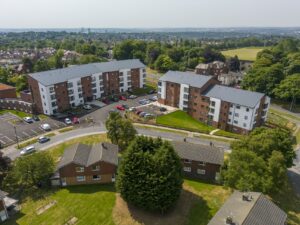 Affordable housing in rural areas is a high priority for local government. Deputy leader at Sevenoaks council, Michelle Lowe, spoke to New Start about greater intervention to solve market failure
Affordable housing in rural areas is a high priority for local government. Deputy leader at Sevenoaks council, Michelle Lowe, spoke to New Start about greater intervention to solve market failure
———————————————————–
On the challenge of rural affordable housing
It does depend on the area. The situation in Sevenoaks is made worse by the fact that we are 93% green belt, and, due to our proximity to London, land prices are really high. So it’s really difficult to make affordable housing viable, because we need cheaper land prices. Other rural areas may have different challenges. They may have cheaper land prices, but they may not have the infrastructure to support more housing.
On the social and economic costs of the housing crisis
There’s a social cost, because younger people do not always choose to move away. Some of them would like to stay and they can’t afford to, so they leave their parents to age without the support networks around them. It also means if younger people start a family they do not have grandparents nearby. We are breaking up families and communities, because they cannot afford to live in the same area. There’s also an economic cost. In Sevenoaks town centre, we have a shortage of lower-paid shop workers. They can’t afford to live there or commute in, so the economy in Sevenoaks town centre is struggling. Also older people’s residential care homes are struggling, because they can’t recruit staff, because workers cannot afford to live here.
On the role local authorities can play in addressing this shortage
We’ve taken a proactive approach. Two years ago, we got our elected members together and brainstormed every issue to do with housing. In my view, one of the reasons people go to food banks is because the cost of housing is so high now. It takes up a higher percentage of their income, so they have less money to spend on food. We debated all the issues and then we commissioned a housing needs survey. We wrote to everybody in our district, so we now really understand our housing needs by ward. We have written a housing strategy, which will go to full council in July and then we can start putting it into action. We want to look at a range of ways to make housing more affordable. We definitely need more social rented accommodation, but we need it in the right places. For example, in Swanley we have an abundance of social rented housing, but we do need some around Sevenoaks town centre. We also want to help people step onto the housing ladder, so we are looking at shared-ownership schemes, micro homes and we are thinking of combining the micro-home product with either a starter home product or a shared-ownership product to try and make it even cheaper. We are looking at the council stepping in and building. If we can’t find a private partner, then we will do it ourselves.
On the role of central government
I think central government (of all parties) can be too prescriptive and they should free up local government to meet their own local needs. We did a housing survey and there were no surprises in it, which made me realise we do have a good grip on our housing needs. Central government could work a lot more in partnership with local government and recognise that one solution is not going to solve the problem, because every local area is different and the only people who understands that need is the local authority, which works in the area and possibly the housing association in that area as well.
On ‘viability’ assessments
Developers play that game all the time. We have an affordable housing target of 40% and the developers come back and say they can’t meet the target, because of viability. It drives the portfolio holder for planning to distraction, so we are looking at the other things we can do to challenge this. One of the things we want to do is start doing post-development analysis to see if what they were saying before the development is actually true.
On the growth of council-owned housing companies
It’s one way of directly meeting local housing needs. For example, in south Norfolk, they have a housing company that builds mainly three bedroom market homes, which they then sell. That’s not what we need in Sevenoaks. The biggest need we have is for two bedroom properties. We’re also looking at if anybody builds two bed flats in the district, they should have lifts, so if people age, they can stay there. We’re looking at homes for life.
On the failure of the market
I think housing is key to many social problems. If we can get housing right, we will solve a whole range of issues. We have got to increase supply and get costs down, and that will help raise living standards. The cost of housing is increasing much faster than wages. I think the government – whether it’s central or local government – now has to step in and try and get the cost of housing down. The market is not going to do it for us. We’ve got to be a lot tougher with developers who land bank. If there is developable land, we need more power to make them build or sell it to someone else who will build. Land-banking is immoral given the issues we face.


















Leave a Reply